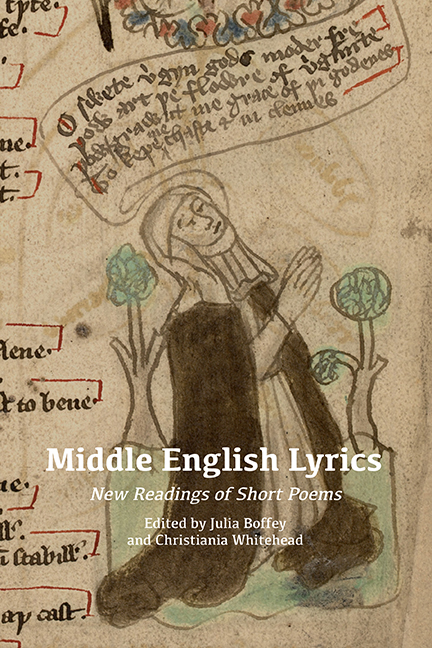Book contents
- Frontmatter
- Dedication
- Contents
- List of Illustrations
- List of Contributors
- Acknowledgements
- Abbreviations
- Introduction
- 1 Editing Issues in Middle English Lyrics
- Part I Affect
- Part II Visuality
- Part III Mouvance, Transformation
- Part IV Words, Music, Speech
- Afterword: The Study of Medieval Lyrics in 1960s Oxford and Today
- Bibliography
- Index of Manuscripts
- General Index
Introduction
Published online by Cambridge University Press: 23 July 2019
- Frontmatter
- Dedication
- Contents
- List of Illustrations
- List of Contributors
- Acknowledgements
- Abbreviations
- Introduction
- 1 Editing Issues in Middle English Lyrics
- Part I Affect
- Part II Visuality
- Part III Mouvance, Transformation
- Part IV Words, Music, Speech
- Afterword: The Study of Medieval Lyrics in 1960s Oxford and Today
- Bibliography
- Index of Manuscripts
- General Index
Summary
The aim of this collection of essays is to remind readers of the extraordinary richness of the body of Middle English poems conventionally, if not always unproblematically, held to be lyrics. ‘The reader of Middle English lyrics need never want for variety’, as Thomas G. Duncan noted in the introduction to the first of two anthologies of lyrics that he compiled for Penguin Classics. Well over two thousand of these poems survive from the years between about 1066 and 1500, strikingly variegated in terms of subject matter, length and form, and constituting an important point of entry into an understanding of medieval English culture. They illuminate religious teaching and pious practice, contemporary conditions and events, the history of feelings and emotions, and reveal much about the ways that speech, song, image and performance related to the written word. Outside the contexts of cultural and literary history, their modes invite analysis of some of the abiding concerns of poetics: voice and moment, shape and cadence. Surviving as inscriptions on tombstones, as graffiti, and on artefacts such as rings and jugs as well as in a variety of written forms in manuscripts, they are testimony to the range of functions fulfilled by medieval verse in many contexts, and to the value and significance that was attached to it.
The variety that characterises this body of poems has proved in the past to be something of an impediment to sustainedly productive scholarship and analysis. Although much industry went into the early collection and editing of ballads, when it came to lyrics most nineteenth-century editors of Middle English verse were understandably more attracted by the challenge of longer works than by the prospect of assembling anthologies from short poems scattered in a range of geographically dispersed witnesses. The earliest relevant collections produced for the Early English Text Society, Furnivall's Political, Religious and Love Poems from Lambeth 306 and Other Sources and Hymns to the Virgin and Christ and Other Religious Poems, Kail's edition of the Digby lyrics and Murray's editions of variant texts of Erthe upon erthe, focused specifically on single manuscripts or small groups of witnesses, and in the last case on just a single poem.
- Type
- Chapter
- Information
- Middle English LyricsNew Readings of Short Poems, pp. 1 - 11Publisher: Boydell & BrewerPrint publication year: 2018



